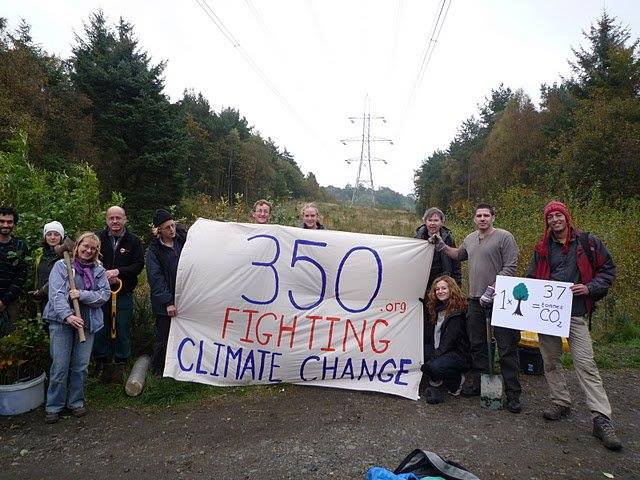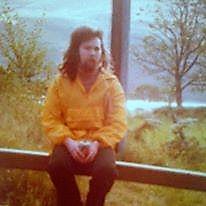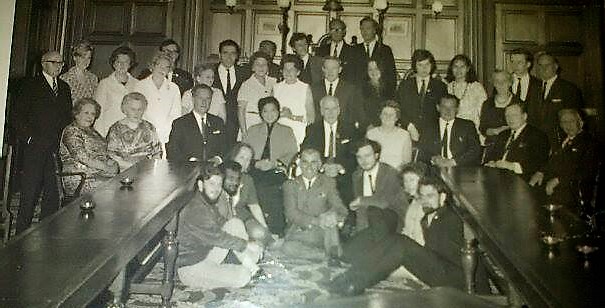
Alan standing behind the banner on the right side
Neil Davidson Archive | ETOL Main Page
PpPublished by rs21, 14 December 2016.
Copied with thanks from the rs21 Website.
Marked up by Einde O’Callaghan for the Encyclopaedia of Trotskyism On-Line (ETOL).
|
Neil Davidson remembers Alan Rae (5 July 1950–12 November 2016) in this obituary in the form of a memoir. |

Alan standing behind the banner on the right side |
When a person very close to us is dying, there is (we dimly apprehend) something in the months to come that – much as we would have liked to share it with him – could only happen through his absence. – Walter Benjamin, One-Way Street (1928)
Man is dead, but his spirit lives – The chant of striking black workers in Durban, South Africa, 9 January 1973
Alan Rae, a friend and comrade for nearly two decades, died on 12 November in Ellen’s Glen Care Home in Edinburgh, almost exactly five years since being diagnosed with Motor Neuron Disease (MND) on 3 October 2011. All fatal diseases are terrible in their own way: the particular cruelty of MND is that it leaves the mind and personality intact, but increasingly trapped in a body that is shutting down.

|
Always a fighter, Alan ‘raged against the dying of the light’ almost until the very end when he began to refuse food in an attempt to hasten the end of a life that he no longer found endurable. Other comrades will have their own memories of Alan, but here I simply want to share my own and to celebrate the kind of activist, the kind of human being, without whom the socialist movement would cease to exist. It is sometimes difficult to recall your first encounter with a particular person – even one who goes on to become a close friend; but I can identify exactly when and where I first encountered Alan Glashan Rae. It was around 7.00 p.m. on Tuesday, 13 April 1999, in the small upstairs function room of the Café Royal on West Register Street, Edinburgh. This was during the war in Kosovo and in the run-up to the first elections to what was then the new Scottish Parliament.
The previous week the SWP had organised a fairly large (100 plus) non-party anti-war public meeting with Labour, SNP, SSP, Kosovar and Kurdish speakers. I was on the SWP’s District Committee at the time and was responsible for the party’s anti-war work in Edinburgh, so at the end of the meeting I duly stood up and said that we should set up a campaign against NATO’s bombing of Serbia. The next day wrote as ‘acting Secretary’ of this putative campaign to everyone who had signed the attendance sheet, inviting them to an organizational meeting upstairs in ‘the Café’ the following week.
Alan was one of the four or possibly five people who turned up. From these inauspicious beginnings we set up the somewhat portentously titled Edinburgh Campaign Against War in Europe (ECAWE), which quickly became an highly effective local group, running several stalls a week and organising a successful conference, much of which was down to Alan’s personal input and initiative. In the intense atmosphere of a campaign you soon get to know which people have to be endured for the sake of unity and those whose company you actively want to seek out. Alan was one of the latter. It turned out that he had an amazing backstory and had been active in the movement since the early 1970s.
Born in Clydebank near Glasgow, Alan had worked and acted as a shop-steward at Upper Clyde Shipbuilders, shortly after the 1971 sit-in. His first political affiliation had been as a member of the Fourth International’s official British franchise, the International Marxist Group, but most striking to me was the fact that he had actually been a member of the Vietnam Solidarity Campaign (VSC). Alan was only seven years older than me, but I had come into political activity with Rock Against Racism in late 1976 and VSC seemed to belong to a different world – variously called ‘1968’ or ‘the long nineteen sixties’ – and one which was rapidly receding into history. Alan was one of the unsung activists of those years who did not abandon his beliefs when our ultimate victory began to seem… less certain than it had once done, but sought new areas in which to put his revolutionary socialist beliefs into practice.
Alan joined the SWP during or shortly after the Kosovo campaign came to an end, but as someone who combined a mercurial temperament with doggedness in defending what he regarded as matters of principle, he subsequently had what might be described as a ‘volatile’ relationship with the party. He left on at least six occasions, although the long-suffering Secretary of Edinburgh South Branch, Pat Smith, always assured me that he would be back – which held true until the crisis of 2012–3, during which the three of us (and most of Edinburgh district’s active membership) left for good, after realising that the organisation many of us had spent decades trying to build was beyond democratic reform.
Our departure more-or-less coincided with the point when the Scottish independence referendum campaign was about to take off in earnest. This was to be the context for the last major disagreement between Alan and me, two years after his diagnosis with MND. I had by this point shifted to a position of active support for independence, after spending many years being deeply sceptical about the possibilities it could offer for socialists.
Alan, like many activists of his generation, found it difficult to abandon the idea that supporting Scottish independence was in effect, capitulating to Scottish nationalism. Ours was not the only friendship to be put under strain by opposing positions on the referendum, but it survived – there are, after all, more important things than the existence or otherwise of a Scottish nation-state. If the left is serious about being, in Robert Burns’ words, ‘of independent mind’ – and Alan certainly was – then these kinds of difference in perspective are only to be expected and the debates they engender welcomed.
When someone dies there can be a tendency to lose sight of the whole person. In particular, when death follows a long illness it can be difficult to think of them as they were before the final stages: it is an experience an increasing number of us have had watching friends and relatives succumb to dementia, a disease as terrible as MND, but in some ways for the opposite reason. It is particularly important then to recall Alan’s entire life – and not only that as a political activist, for Alan had an extremely broad ‘hinterland’.

Clydebank Town Council reception c. 1969 for Lin Qui, with councillors |
He studied Experimental Psychology at Sussex University in the late 1970s. (His friends – OK, me and Raymond – would tease him about having gone to such a den of postmodern iniquity, much to Alan’s annoyance). He was a keen runner throughout his life, until his illness made it impossible, and once represented the university at cross-country. He would think nothing of heading off to Portugal to athletics training camp and even did martial arts at one point.
During the 1980s he lived in New York when it was still the city of Mean Streets and Annie Hall, of Max’s Kansas City and loft living, before Mayor Giuliani gentrified Manhattan and it became too expensive a place for working class people to live. Some people are described as being able to start a fight in an empty room; this was never Alan, but he could and would start a conversation in a room if there was only one other person in it. One of his most attractive qualities was his openness and interest in other people, and zest for finding out about them. His increasing inability to do this as the disease took hold and he had to rely on his Blackberry to communicate was one of the most painful aspects for him.
The other way of obscuring the whole person is to sanctify or prettify their personality. The same characteristics which made Alan such a committed and principled socialist also meant that he could be ‘difficult’, or in the plain English of which he approved, a complete pain in the arse – but how we miss his cussedness now!
It did, however, enable him to bear his affliction with amazing fortitude almost to the very end, even though the inner frustration and torment was only too obvious. He would often text about his condition and the quality (or lack of quality) of his care and was still campaigning to the end to improve it, not only for himself but – typically – also for those coming after him.
Towards the end though he was struggling to make himself comfortable and texting was clearly becoming more difficult. He feared losing the use of his hand and the ability to text and, when he felt this was imminent, he took the brave decision to limit his food intake: his final act of self-determination.
I dedicated my most recent book, Nation-States: Consciousness and Competition, to Alan: apart from regularly visiting him with other friends and comrades, it was the last thing I could do for him, the only commemoration I could make. Marxists believe that there is nothing beyond this world: that is why we seek to transform it; but the dead live on in our memories and, to paraphrase Walter Benjamin, the new world is made as much for those, like Alan, whom we have lost, as much for those who come after. The man is dead, but his spirit lives.
Neil Davidson Archive | ETOL Main Page
Last updated: 16 May 2020